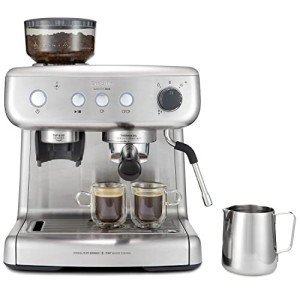Home Use Espresso Machines: A Comprehensive Guide
Espresso machines have become a staple in many homes as coffee lovers look for to replicate café-quality brews in the comfort of their kitchens. The increase in popularity has resulted in a varied market filled with numerous designs, functions, and rates. This article aims to offer an informative overview of home use espresso machines, helping readers navigate their options effectively.
Understanding Espresso Machines
Espresso machines work by forcing warm water through finely-ground coffee under high pressure, leading to a focused coffee beverage called espresso. There are several types of espresso machines categorized based on their brewing approaches and level of automation. The most common types consist of:
- Manual Espresso Machines: These need the user to control the pressure and water flow, permitting a more hands-on coffee-making experience.
- Semi- Automatic Espresso Machines : These use automatic control over water pressure, while the user by hand grinds and tamps the coffee.
- Automatic Espresso Machines: With the push of a button, these machines instantly control the flow of water, making it simpler to brew espresso with consistent outcomes.
- Super-Automatic Espresso Machines: These all-in-one machines handle grinding, tampering, developing, and even milk frothing, making them perfect for users searching for benefit.
- Pill or Pod Machines: These use pre-packaged coffee pods to create espresso with very little effort, but they limit option in brewing techniques and flavors.
Table: Comparison of Espresso Machine Types
| Type | Control Level | Relieve of Use | Cleaning Level | Suitable For |
|---|---|---|---|---|
| Manual | User-controlled | Moderate | High | Coffee perfectionists |
| Semi-Automatic | Partial automation | Moderate | Moderate | Home baristas |
| Automatic | Fully automated | Easy | Low | Hectic people |
| Super-Automatic | Fully automated | Extremely easy | Extremely low | Convenience applicants |
| Capsule/Pod | Completely automated | Extremely easy | Extremely low | Casual drinkers |
Key Features to Consider
When picking a home use espresso machine, it's necessary to think about different functions that can considerably affect the quality of espresso and user experience.
- Pressure: Look for machines that provide at least 9 bars of pressure, as this is thought about optimum for developing espresso.
- Boiler Systems: Single vs. dual boiler systems determine temperature level stability and the ability to brew espresso and steam milk simultaneously.
- Grinder: Integrated grinders enable newly ground coffee, which enhances flavor. Think about machines with adjustable grind settings.
- Milk Frother: For those who enjoy cappuccinos and lattes, an integrated steam wand or automatic frother is crucial.
- Size and Design: Consider your cooking area space and visual choices. Machines are available in various sizes, from compact to big setups.
- Rate: Home espresso machines can vary from a couple of hundred to several thousand dollars, so it's essential to establish a budget before checking out choices.
Pros and Cons of Home Use Espresso Machines
| Pros | Cons |
|---|---|
| Convenience of brewing coffee in your home | Preliminary investment can be high |
| Quality of espresso is frequently remarkable | Needs some ability, particularly with manual machines |
| Ability to try out tastes | Maintenance and cleaning can be labor-intensive |
| Can save money in the long run | Not all machines will match every coffee preference |
Upkeep and Cleaning Tips
Maintaining an espresso machine is essential for extending its life and making sure constant brew quality. Here are some helpful tips:
- Regular Descaling: Minerals from water can develop in the machine. Descale every 1-3 months, depending upon water firmness.
- Daily Cleaning: Rinse portafilters, baskets, and steam wands after each use to avoid coffee oils from constructing residue.
- Use Filtered Water: This can help reduce mineral buildup and enhance the taste of coffee.
- Replace Gaskets and Seals: These elements might wear with time and must be replaced to keep pressure and efficiency.
- Check out the Manual: Each machine has particular care guidelines; following these will make sure durability.
FAQs About Home Use Espresso Machines
Q1: What is the very best budget espresso machine?The best budget espresso machine typically depends upon private requirements, but models like the DeLonghi EC155 or the Breville Bambino are popular among users for offering fantastic worth. Q2: How long do home espresso machines normally last?With correct maintenance, home espresso machines can last anywhere from 5 to 15 years, depending on the quality of the machine and frequency of use. Q3: Can I make coffees and lattes with any espresso machine?While most espresso machines can make coffees and lattes, having a trusted
steam wand or frother is vital for attaining the right milk texture.
Q4: Are super-automatic machines worth the investment?For those who focus on convenience and quick brewing, super-automatic machines can be worth the investment, though they may lack some customizability in brew strength and flavor. Bean To Cup Espresso Machines : What kinds of coffee beans are best for espresso?While individual choice plays a function, beans labeled as" espresso "blends are generally roasted darker, developing rich flavors and a creamy texture when brewed.
Investing in a home espresso machine can change the daily coffee routine into something unique, elevating home brews to café quality. By understanding the various types of machines, essential functions to think about, maintenance requirements, and weighing the
advantages and disadvantages, customers can make informed choices that match their private choices. As the espresso culture continues to grow, no matter the option, every brew can be a delicious experience waiting to be relished.

